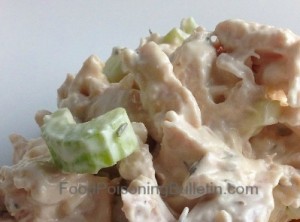A massive recall of Taylor Farms celery products was issued on November 26, 2015 after testing discovered E. coli O157:H7 bacteria in one of the products. A celery and onion mix produced by Taylor Farms was used to make Costco Wholesale Rotisserie Chicken Salad that is linked to a multistate E. coli outbreak. That outbreak prompted the Montana Health Department to test the Taylor Farms product, and the bacteria was discovered.
 The CDC has advice to consumers about this recall and outbreak. If you purchased rotisserie chicken salad from any Costco store in the United States on or before November 20, 2015, do not eat it. Throw it away, even if part of it has been eaten and no one has gotten sick. Then wash your hands carefully and clean out the fridge where the salad was sold.
The CDC has advice to consumers about this recall and outbreak. If you purchased rotisserie chicken salad from any Costco store in the United States on or before November 20, 2015, do not eat it. Throw it away, even if part of it has been eaten and no one has gotten sick. Then wash your hands carefully and clean out the fridge where the salad was sold.
The recalled Costco product is labeled “Chicken Salad made with Rotisserie Chicken” and has the item number 37718 on the label. This product has a typical shelf life of three days, but some people may store the product in their home freezer.
If you purchased any of the recalled Taylor Farms celery products, do not eat them. Throw them away in a sealed or double bagged container so other people and animals can eat them, then wash 9our hands carefully. Look at the list carefully, since the recall includes 71 products. Some of those products are chicken salad kits, turkey sandwiches, carrot and celery trays, diced celery, Asian salads, Macaroni salad, potato salad, and diced celery. Different products were sold in various states around the country. Some are food service products; others were sold directly to consumers.
The recalled products were sold at Costco stores, King Sooper, 7-Eleven, Pantry, Raleys, Savemart, Tonys, Albertsons, Safeway, Vons, Starbucks, Target, and Walmart across the country. The expiration dates on these products extend into December 2015.
Some of the patients in this outbreak have been seriously ill. Five people have been hospitalized as a result of their illnesses, and two people have developed hemolytic uremic syndrome (HUS), which causes kidney failure.
The symptoms of an E. coli O157:H7 infection include watery and/or bloody diarrhea, severe and painful abdominal cramps, a mild fever, nausea, and vomiting. Symptoms usually appear three to seven days after exposure to this bacteria. An accurate diagnosis for this infection is crucial, since if a patient is given antibiotics, the development of HUS becomes more likely.
The symptoms of hemolytic uremic syndrome include little or no urine output, skin rash, pale skin, lethargy, bleeding from the nose and mouth, and easy bruising. This complication can cause kidney failure, seizures, strokes, and death, so anyone who is experiencing those symptoms should see a doctor immediately.




